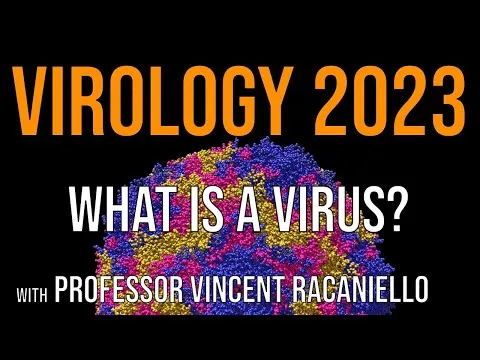
Virology Lectures 2023 #2: The Infectious Cycle 
Discover the fascinating world of virology with Virology Lectures 2023 #2: The Infectious Cycle. Dive into the complete course of events in a virus-infected cell, known as the infectious cycle, and explore the various phases and methods for studying it. From plaque assays to high-throughput sequencing, you'll learn the physical methods used to detect viruses, including the groundbreaking identification of the pandemic coronavirus SARS-CoV-2 in early 2020. Join Professor Vincent Racaniello, a renowned virology expert, on this educational journey and support his work by becoming a patron of MicrobeTV. Don't miss out on this opportunity to expand your knowledge of virology! ▼
ADVERTISEMENT
Course Feature
![]() Cost:
Cost:
Free
![]() Provider:
Provider:
Youtube
![]() Certificate:
Certificate:
No Information
![]() Language:
Language:
English
![]() Start Date:
Start Date:
2023-01-24 00:00:00
Course Overview
❗The content presented here is sourced directly from Youtube platform. For comprehensive course details, including enrollment information, simply click on the 'Go to class' link on our website.
Updated in [September 25th, 2023]
We considered the value of this course from many aspects, and finally summarized it for you from two aspects: skills and knowledge, and the people who benefit from it:
(Please note that our content is optimized through artificial intelligence tools and carefully reviewed by our editorial staff.)
What skills and knowledge will you acquire during this course?
During the Virology Lectures 2023 #2: The Infectious Cycle course, students will acquire the following skills and knowledge:
1. Understanding the phases of the infectious cycle: Students will learn about the complete course of events in a virus-infected cell, including viral entry, replication, assembly, and release.
2. Methods for studying the infectious cycle: Students will be introduced to various techniques used to study the infectious cycle, such as plaque assay, multiplicity of infection, and the particle-to-pfu ratio.
3. Physical methods for detecting viruses: Students will learn about different physical methods used to detect viruses, including hemagglutination, serological techniques, polymerase chain reaction (PCR), and high-throughput sequencing.
4. Identification of SARS-CoV-2: Students will understand how the mentioned methods were used to identify the pandemic coronavirus SARS-CoV-2 in early 2020.
Overall, this course will provide students with a comprehensive understanding of the infectious cycle and the methods used to study and detect viruses.
Who will benefit from this course?
This course on Virology Lectures 2023 #2: The Infectious Cycle will benefit individuals with interests or professions in the field of virology, microbiology, infectious diseases, and public health.
1. Virologists and Microbiologists: This course provides in-depth knowledge about the infectious cycle of viruses, including the different phases and methods for studying it. Virologists and microbiologists can enhance their understanding of viral replication and infection processes, which can contribute to their research and development of antiviral therapies and vaccines.
2. Infectious Disease Specialists: Professionals specializing in infectious diseases can benefit from this course as it covers the methods for detecting viruses, including serological techniques, polymerase chain reaction, and high-throughput sequencing. This knowledge can aid in the diagnosis and management of viral infections.
3. Public Health Officials: Understanding the infectious cycle of viruses is crucial for public health officials in managing and controlling viral outbreaks. This course provides insights into the methods used to identify and study viruses, such as the plaque assay and multiplicity of infection. This knowledge can inform public health strategies and interventions during viral outbreaks.
4. Medical and Healthcare Professionals: Healthcare professionals, including doctors, nurses, and laboratory technicians, can benefit from this course as it deepens their understanding of viral infections. This knowledge can aid in the diagnosis, treatment, and prevention of viral diseases, including the pandemic coronavirus SARS-CoV-2.
5. Researchers and Scientists: Researchers and scientists in various fields, such as molecular biology and genetics, can benefit from this course as it provides a comprehensive understanding of the infectious cycle of viruses. This knowledge can be applied to various research areas, including viral pathogenesis, host-virus interactions, and the development of novel antiviral strategies.
Course Provider

Provider Youtube's Stats at AZClass
Discussion and Reviews
0.0 (Based on 0 reviews)
Explore Similar Online Courses

Virology Lectures 2023 #1: What is a virus?

Virology Lectures 2023 #5: Attachment and Entry

Python for Informatics: Exploring Information

Social Network Analysis

Introduction to Systematic Review and Meta-Analysis

The Analytics Edge

DCO042 - Python For Informatics

Causal Diagrams: Draw Your Assumptions Before Your Conclusions

Whole genome sequencing of bacterial genomes - tools and applications

Virology Lectures 2020 #1: What is a Virus?

Virology Lectures 2021 #1: What is a Virus?


Start your review of Virology Lectures 2023 #2: The Infectious Cycle